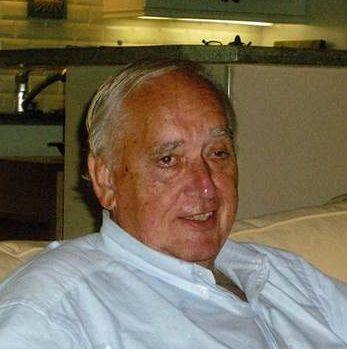

Obituary of David Burgin
Please share a memory of David to include in a keepsake book for family and friends.
C. David Burgin, age 75, born February 12, 1939 in Somerset, Kentucky to Lester and Lillian Burgin, passed away peacefully at home on Monday, June 16, 2014 in Houston, Texas.
David was a newspaper executive who served as editor-in-chief of seven American dailies. In a career of more than 50 years, David served as a mentor to dozens of reporters and writers, including Pulitzer Prize recipients.
"Innovation is inspiration" and "A good idea by itself is news" were David's mottos as he warred against sloppiness, stodginess and clichés. His newsroom leadership was occasionally called "colorful," a word he would denounce as un-specific.
David subscribed to the mission of newspapers defined by "Mr. Dooley," the 19th-century Chicago bartender created by Finley Peter Dunne -- "to comfort the afflicted and afflict the comfortable." In 2008, a real-life San Francisco bartender, Michael McCourt, greeted David's return to the city, by exclaiming, "Dave Burgin! What city are you pissing people off in now?"
When David was still a child, his family moved to Dayton, Ohio, where he attended Roosevelt High School and according to his sister, Bonnie Prather of Denver, when David was 12, he would sneak out of the house and spend all night at the Dayton Daily News, working for free because he loved being around newspapers.
David, a graduate of Miami University of Ohio, is a veteran of the U. S. Army in which he served from 1961 to 1963. While off duty, he worked nights for the New York Herald Tribune, which hired him as a reporter after his return to civilian life.
After reporting for the Newspaper Enterprise Association, he joined the Washington Daily News, as a columnist and sports editor. In 1969, he interviewed the new manager of the Washington Senators, Ted Williams.
The former slugger, who made a science of hitting, often taunted reporters by asking "What makes a curve ball curve?" David, because of his boyhood in Dayton, home town of Wilbur and Orville Wright, knew something about aerodynamics and answered, "It's differential pressure." The astonished Williams became David's friend and admirer.
The Washington Star was David's next stop in 1971, where he became sports editor, then city editor and assistant managing editor. Among the reporters he encouraged were two Hollywood screenwriters, Randy Sue Coburn and David Israel. Another star at the Star was Maureen Dowd, who went on to The New York Times and was awarded a Pulitzer Prize for commentary in 1999. Another Times writer, Ira Berkow, sports columnist and author, was also Burgin's protégé.
Talent intrigued David wherever he found it; in saloons, for instance. In 1977, he asked two bartenders in Washington, D.C., to try journalism. Both did. Chris Reidy went from David's tutelage to the business pages of the Boston Globe and Steve Daley became a columnist for the Chicago Tribune.
David's experience as a reporter, city editor and sports editor prepared him for his first job as editor-in-chief in 1977 at the Paterson News in New Jersey.
In 1979, Chicago's Tribune Company asked him to oversee the merger of two dailies south of San Francisco. The Palo Alto Times and the Redwood City Tribune became the Peninsula Times Tribune, which David edited until 1981. The paper resembled Newsday, a New York daily serving Long Island.
Newsday thrived amid new suburbs east of New York City, small towns whose population swelled after World War II and into the 1950s. In California, however, subscribers in more settled towns missed their local papers. As larger dailies in San Francisco and San Jose increased coverage, the Peninsula Times Tribune ended publication in 1992.
David Burgin was by then editing one of the Tribune Company's prize properties, the Orlando Sentinel, serving Florida's fast-growing city. David poached some of his writing talent from Palo Alto to help cover the effects of Disney World on central Florida's growth.
The San Francisco Bay Area beckoned again when the Hearst Corporation asked David to edit the Examiner, the first Hearst newspaper, founded in 1883 by William Randolph Hearst, who called it "The Monarch of the Dailies." David ran the Examiner in 1985 and 1986.
In the 1980s, as the rise of the internet accelerated mergers and newspaper closings, David moved to Texas to edit newspapers owned by William Dean Singleton, a publisher David first met in the 1970s when both worked at the Washington Star. David ran the Dallas Times Herald for two years before its demise in 1991 and the Houston Post for two years. The Post closed in 1995.
David met his 'yellow rose of Texas' when he moved to Houston in 1988 to take over The Houston Post. He and Judy fell in love, married and moved to the San Francisco Bay Area when David took over the California dailies in 1990.
Singleton had acquired six papers in the San Francisco area, the largest of which was the Oakland Tribune. David was editor and vice president of the Bay Area Newspaper Group from 1990 to 1997. Judy and David treasured their time there and shared a wonderful life together.
In 1997, while still recovering from his first of four major strokes, David went into the book business. He took over Woodford Publishing, which produced large-format books including, among many others, a history of Pan Am Airways, a biography of Texas legendary singer Jerry Jeff Walker and the memoirs of Hank Greenwald, the longtime broadcaster of the San Francisco Giants.
Journalism, especially in San Francisco, proved irresistible to David, when, in 2000, he returned to the editor's chair of the Examiner.
No longer owned by Hearst, the Examiner had ended its joint operating agreement with the San Francisco Chronicle. Once an afternoon paper, it now competed in the morning against the Chronicle. David joined it in 2000. When the world was reeling in 2001 from the 911 terrorist attacks on the World Trade Center, David Burgin created a front page that is still featured at the Newseum in Washington, D.C.
Mary Schmich, whom David hired as a Peninsula Times-Tribune feature writer, received a Pulitzer in 2012 for her columns in the Chicago Tribune. She thanked David "for giving me my first breaks, my formative education, a belief in my voice and for remaining my friend and inspiration."
Besides newspapers, David's other passion was golf. As a scratch or low handicap golfer, a member of the San Francisco Olympic Club and a former member of the Columbia Country Club in Chevy Chase, Maryland. In 1986, David played in the AT&T Pro-Am / Pebble Beach Golf Classic and out-scored the pro!
In 2008, Judy and David returned to be with their family in Houston, Texas.
David is survived by his loving wife Judy of Houston; sisters, Bonnie Prather of Denver and Patricia Farmer of Worthington, Ohio; two stepdaughters, Kelly Moore of Houston and Kerry Ready of Austin; five grandchildren; numerous nieces and nephews; and beloved caregiver Margaret (Tessie) Woods of Houston.
A celebration of David's life will be held at 2:00 p.m., on Sunday, June 22, 2014 at the Houston Country Club, 1 Potomac Drive, in Houston, Texas.

